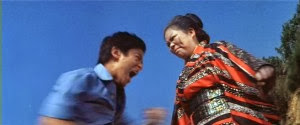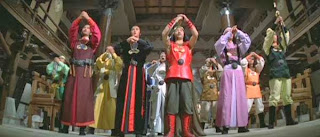

Next up for all you martial arts movie fans out there is a gem from 1973 featuring the main man Jimmy Wang Yu, Knight Errant!! This flick from the First Films studios also stars Kurata Yakasaki, Shen Mao, Lung Fei and Tse Gam-Guk along with others, most notably Blacky Ko. (yeah, that name would stand out.) In the director's chair on this picture is Ting Shan-Hsi.

Knight Errant opens with a flashback scene set
in 1937 during the latter years of Japanese
occupation of Taiwan. We see someone behind
a shoji screen kneeling, and a mother
and three young boys with her on the other
side of it. In dramatic fashion, the figure
raises a katana blade and sticks it into
their belly. After a few jump cuts to the
mother & children, we find ourselves outdoors
in the present day. A mature woman dressed
as a karateka(Gam-Guk) is issuing orders to three
men. She's billed as 'The Lady With The Iron
Fists!' and nothing else throughout the picture.
The training sequence sets up the opening
credits full of high-flying kicks and cascading
music. If that opening music gets you REALLY
hype when you hear it, there's a reason. The
track is actually soul legend Solomon Burke's
'Cool Breeze' for the Blaxploitation classic
of the same name starring Thalmus Rasulala.
And it's also the basis for 'Apollo Kids',
the bangin' classic by Ghostface Killah.
(Side note - Curtis Mayfield gets sampled
in this flick too early on.) It turns out
that the three men, Tetsuro(Kurata), Masaki
(Fei) and Takito(Mao) are those same three
boys we see earlier. And they've been pushed
to the limit training for one reason: revenge.


The Lady With The Iron Fists sits the three
down after another session in the dojo where
she shows exactly how tough she is. By having
four of her students hold her down by each of
her limbs and another student jump up and
down on her STOMACH. Mind you, the dude doing
this isn't tiny by any stretch. She tells them
again that their mission is to avenge their
father's seppuku & their mother's later suicide.
See, their father was one Captain Mishima, who
commanded a prison in the area. He captures
a spy, Kebu and sets the order for execution.
But Kebu escapes with the help of rebels and
a man under Mishima's command, Lin Ming Cheung
(Ngai So). The uproar caused Mishima to resign
and take his own life. His wife then followed
after. The plan is then set in motion for the
three to hit Taiwan and find Ming Cheung and
kill him. At this point, we find that Ming
Cheung owns a small restaurant, and helps to
take care of his two sons, a cousin and a
daughter who's blind. Enter Lin Huo-Shan(Wang
Yu), the eldest son who is a well-meaning cab
driver who always winds up in a fight. And
these fights wind up being a real drain on
the family's savings, which are sorely needed
to help repair his sister Yueh Fung's (Chen Ying
Fung)blindness. Huo-Shan also tries to keep
up his relationship with his girlfriend in
the midst of all this when the three brothers
come to town. And then things really get
complicated, leaving Huo-Shan no choice but
to get involved and settle things once and
for all.



Knight Errant is an interesting flick. For
one, this comes at the beginning of Wang Yu's
newly-found independence. Prior to this, he
was a box-office star in Hong Kong with Shaw
Studios. But due to his desire to be paid
more, Wang Yu broke his contract with Shaw.
That led to him being unable to ever make a
movie in Hong Kong going forward. Taiwan then
became a major backdrop for all of his films.
What makes this movie stand out during this
period before his later hits is that for one,
it shines a light on anti-Japanese sentiment
that was rising steadily in these films in
conjunction with World War II. But it does
so as a key part of the plot without diving
into stereotypes. Outside of Huo-Shan stating
he hates the Japanese midway through the flick,
the sentiment is very light. Wang Yu is gold
here, giving some warmth as a dutiful son
trying his best. There's also comedy at work
here(keep an eye on the scene where he rescues
his girl in a restaurant) both intentional
and unintentional. See the pic below:

Yeah, that's Huo-Shan RUNNING OVER The Lady
in his taxi as part of the final fight of the
movie. I would've loved to have been a fly
on the wall and have heard how they came
up with this. It does give one slight pause
that he'd do that to an older woman or a
woman period but that got put aside 'cause
she was a villain and as such, could be dealt
with in any fashion. Putting that aside for a bit,
the rest of the cast does well here. Kurata
does make for a charismatic villain, and
Lung Fei and Shan Mao do well here too. Mao
actually stands out in another respect; he
basically is known for being highly exaggerated
with his facial expressions and movements in
his film career. Here, he kind of gives way
to Gam-Guk in that arena. Gam-Guk in this
film is striking because she's the ultimate
villain of the film, but we don't know how
she got into the boys' lives. Also, she heads
up her own school. Gam-Guk would only be in
five films total in her career, with this
and Kung Fu Mama being the highlights.
According to some scant research, she was
also a herbologist in addition to acting. She
is quite formidable in this flick. Don't believe
me? Peep how she comes back AFTER GETTING
RUN OVER to give Wang Yu a two-piece. The
action is brutal without being too bloody
and makes Knight Errant more than a
standard revenge fight flick. Go peep it when
you can, it's actually on the 'Net now!
RATING: 4 Dragon Punches Out Of 5











































